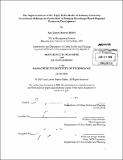| dc.contributor.advisor | Alice Amsden. | en_US |
| dc.contributor.author | Ramos-Maltés, Ana Lorena | en_US |
| dc.contributor.other | Massachusetts Institute of Technology. Dept. of Urban Studies and Planning. | en_US |
| dc.coverage.spatial | nwpr--- | en_US |
| dc.date.accessioned | 2010-10-29T18:34:30Z | |
| dc.date.available | 2010-10-29T18:34:30Z | |
| dc.date.copyright | 2010 | en_US |
| dc.date.issued | 2010 | en_US |
| dc.identifier.uri | http://hdl.handle.net/1721.1/59765 | |
| dc.description | Thesis (M.C.P. and S.B. in Planning)--Massachusetts Institute of Technology, Dept. of Urban Studies and Planning, 2010. | en_US |
| dc.description | Cataloged from PDF version of thesis. | en_US |
| dc.description | Includes bibliographical references (p. 78-84). | en_US |
| dc.description.abstract | Puerto Rico, an island in the Caribbean, has long sought to develop a high-tech economy and has struggled in the process. Two initiatives, Puerto Rico TechnoEconomic Corridor (PRTEC) and the Eastern Central Technological Initiative (INTECO) seek to encourage local firm formation, attract foreign capital, and improve infrastructure to develop a high-tech economy and an innovation culture in the island. The efforts of the initiatives focus on cooperation from the private sector, the government, and academia. Henry Etzkowitz's triple helix model of university-industry-government relations explains the synergies and organizational infrastructure needed to ensure a sustainable economic growth based on technology and innovation. This thesis focuses on the two initiatives in Puerto Rico whose goal is to promote a high-tech economy in the island. The analysis focuses on the initiatives' relationship with the triple helix's three sectors and how they have been working together to achieve their goals. While the initiatives have made significant progress in firm formation through incubators and community outreach programs to educate about technology, organizational barriers such as lack of transparency in the local grant seeking process and the lack of an entrepreneurial culture have not allowed the initiatives to solidify themselves as the generators of the new knowledge-based economy in Puerto Rico. | en_US |
| dc.description.statementofresponsibility | by Ana Lorena Ramos-Maltés. | en_US |
| dc.format.extent | 84 p. | en_US |
| dc.language.iso | eng | en_US |
| dc.publisher | Massachusetts Institute of Technology | en_US |
| dc.rights | M.I.T. theses are protected by
copyright. They may be viewed from this source for any purpose, but
reproduction or distribution in any format is prohibited without written
permission. See provided URL for inquiries about permission. | en_US |
| dc.rights.uri | http://dspace.mit.edu/handle/1721.1/7582 | en_US |
| dc.subject | Urban Studies and Planning. | en_US |
| dc.title | The implementation of the triple helix model of industry-university-government relations in Puerto Rico to promote knowledge-based regional economic development | en_US |
| dc.type | Thesis | en_US |
| dc.description.degree | M.C.P.and S.B.in Planning | en_US |
| dc.contributor.department | Massachusetts Institute of Technology. Department of Urban Studies and Planning | |
| dc.identifier.oclc | 670695407 | en_US |
